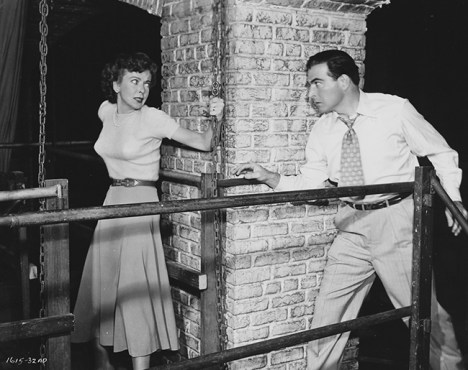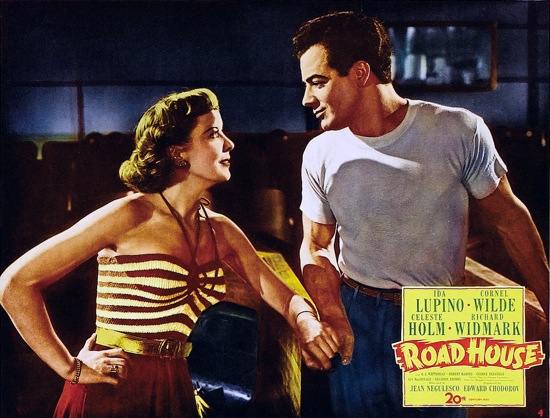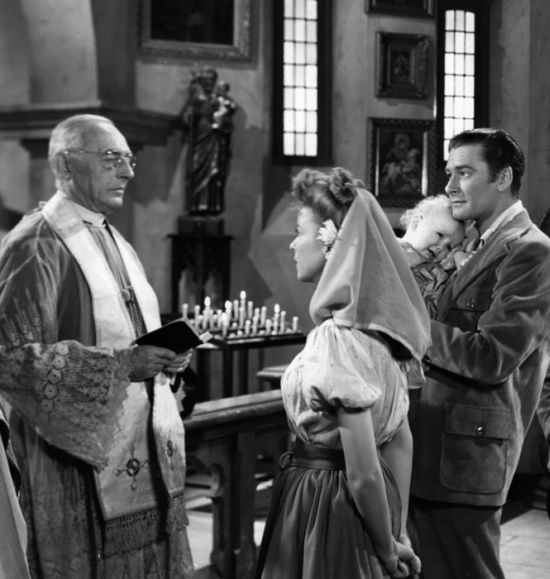In my research for tonight’s TCM Party, Woman in Hiding (1950), I found an abundance of interesting information about the film’s star, Ida Lupino, that is way too long for a tweet and much better suited to a blog post. This is very far from comprehensive but I hope it will pique interest in this fascinating woman who was a pioneer in so many ways. I was aware that she was one of the few female directors and was the only one working in Hollywood in the late ’40s through the mid ’50s, but I didn’t know that she also wrote film and television scripts and directed television shows throughout the ’50s and ’60s, including episodes of The Fugitive, Bewitched, and Gilligan’s Island.

Lupino was born in Camberwell, London, England in 1918 (though the year is variously given as 1916 or 1914). Her mother was an actress; her father was a comedian from a famous theatrical family. Her uncle, Lupino Lane, was an acrobat. She wrote a play for school at the age of seven and trained for a year at the Royal Academy of Dramatic Art. She was in five films in England before moving to Hollywood in 1933, when she was hired to make two films at Columbia.
She often played tough but sympathetic women who had their share of hard luck. Her role in one of my favorite films noir Road House (1948) with Richard Widmark and Cornel Wilde seems to be a fairly typical one for her; she plays Lily, a worldly-wise singer caught between her boss Jefty and his childhood friend Pete. When Lily falls for Pete and turns down Jefty’s marriage proposal, Jefty frames Pete for embezzlement, he’s convicted, and they are trapped. It’s a really concise, enjoyable noir, with Widmark at his crazy-bad best. Lupino did her own singing, which included Johnny Mercer’s “One for My Baby (and One More for the Road).” Two other favorites of mine are High Sierra (1941) with Humphrey Bogart and Devotion (1946), about the Brontë family, in which Lupino plays Emily.
She was cast against type in Escape Me Never (1947) as an impoverished single mom being taken care of by Errol Flynn’s character. The picture flopped but Lupino and Flynn became good friends and stayed close. Her nickname for him was “The Baron” and he called her “Mad Idsy.” [tcm.com]
Lupino often referred to herself as “the poor man’s Bette Davis.” While under contract with Warner Brothers, she would pass on Davis’ seconds, often getting herself suspended. Bored during this down time, she developed a curiosity about filmmaking and began to linger on sets, learning the craft of directing. [imdb.com]
She became a director accidentally, taking over Not Wanted (1949) for Elmer Clifton, who had a heart attack three days into filming, though she did not give herself director credit. She was already producing and had co-written the script about an unmarried pregnant girl who gives her baby up for adoption. Her films, whether she worked as director, writer, producer or all of the above, often dealt with subjects that weren’t openly discussed in US society at the time, such as pregnancy outside marriage, rape (Outrage (1950)), and bigamy (The Bigamist (1953)). It seems to me that Lupino was the unintentional model for today’s writer/director/producer/actors who at times take jobs in front of the camera to secure funding so they can be behind it for their next projects. Sean Penn and Sarah Polley are two I thought of. The production company Lupino formed with her husband Collier Young, The Filmakers [sic], made a total of 12 films.
As a director, Lupino is known for her ability to create suspense, a talent that served her well as she moved into television work in the mid-’50s and ’60s. Her fifth film, The Hitch-hiker (1953), is about a couple of guys on their way to a fishing trip in Mexico who, as you might guess, pick up a murderous hitchhiker. Lupino builds tension by confining some of the action to the interior of the car going through the isolated Mexican desert. Even when they’re not in the car, the buddies are cornered by the psychopath and his gun. Hitch-hiker is available to watch for free on YouTube or at Internet Archive.
Just as Nora Ephron blazed a trail for Diablo Cody, so did Ida Lupino for the women who came after her.
More on Ida Lupino:
The Museum of Broadcast Communications Bio
Women Directors…Special Tribute to Ida Lupino at Once Upon a Screen



Fine profile on this extraordinary performer, Paula. She could still command a screen in her later years, too, even in small roles. If you’ve not seen it, I recommend Sam Peckinpah’s (yes, that Sam Peckinpah) JUNIOR BONNER. It’s a thoroughly understated, and unexpected, character piece modern western (1972). Robert Preston and Ida play Steve McQueen’s parents, and it is just a warm, sentimental film that has aged marvelously in its 40 years. Ida helps to make it memorable. Thanks, Paula.
You’re welcome and thanks for your kind words, Michael. I have not seen JUNIOR BONNER. It sounds very different from the rest of Peckinpah’s work. I’ll have to check it out.
wow, quite the accomplished director and actress! Always loved her.
I did too, but I never realized all the other stuff she did in addition to acting. Amazing lady. Thanks Val 🙂
What a wonderful and informative post, Paula. I’m afraid I wasn’t aware of Ida Lupino but that’s very cool that she was as much a trailblazer for other female actresses/directors in the business, just like Nora did. I’m going to check out one of her films now.
You’re welcome & thanks Ruth! Definitely do. I don’t think it matters which one you start with, I think Road House was the first one of hers I ever saw.
Great article. Didn’t know about her writing, directing, & producing. I think it’s cool how she refused Davis’ cast-off roles even though it meant she was suspended. Shows courage.
Thanks! Yes, Lupino definitely did not want to be the second choice ever. It must have been difficult for her, because I believe when actors got suspended they didn’t get paid, but it led her down a way more rewarding path.
Hi, Paula and company:
Excellent, fun article!
Hollywood consistently under rated or ignored Ida Lupino’s many talents. I’ve admired her ability to take on topics that were close to taboo at the time and make them known.
IIRC, Ms. Lupino is also close to solely responsible for the popularity of the old Richard Boone western series, ‘Have Gun. Will Travel’.
TCM gets very high marks for its recent tribute to this great dame of film and television!
Thanks Jack! I agree, think she raised awareness of things that most people didn’t really think about and that alone was something. But to accomplish that as a woman in a very male-dominated field was amazing.
Never saw that show…but based on the comments during the Woman in Hiding TCM Party…I don’t doubt that she attracted many of the audience for it 😉
TCM is pretty darn cool. I’d like them to feature some of Lois Weber’s work, but they are limited of course by what they can get the rights to, etc.